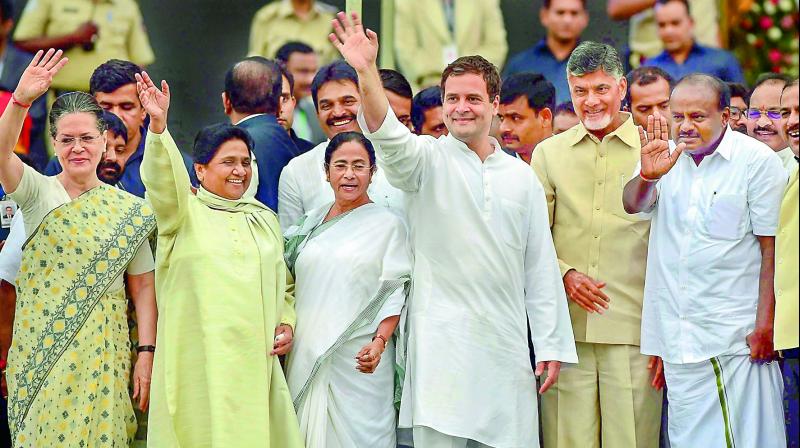Despite the bonhomie, Opposition unity is not easy

The camaraderie between 20 Opposition leaders, and a most unusual hug between UPA chairperson Sonia Gandhi and Bahujan Samaj Party supremo Mayawati, that unfolded at Vidhana Soudha as Karnataka’s new chief minister H.D. Kumaraswamy of Janata Dal (S) and his deputy G. Parameshwar from the Congress took the oath here Wednesday, is being talked about as the template for an anti-BJP front at the national level for the 2019 Lok Sabha elections. However, can mere physical proximity automatically translate into a foolproof alliance?
While arch political rivals like the Samajwadi Party’s Akhilesh Yadav and BSP’s Mayawati have already showed the way forward by burying their differences to steal Phulpur and Gorakhpur from under UP chief minister Yogi Adityanath’s nose, the arrival of every Opposition leader worth his name has raised hopes of a larger coalition, but that could be belied; the handshake between old adversaries Mamata Banerjee and Sitaram Yechury notwithstanding.
The elephant in the room is whether the Congress is willing to take this experiment, of playing second fiddle to a regional party, as the model for a grand coalition to face down Prime Minister Narendra Modi and the BJP in 2019. No doubt Mrs Sonia Gandhi’s warmth towards Mayawati papers over the bad blood of the past, and the presence of diehard anti-Congress leaders like Andhra chief minister N. Chandrababu Naidu and NCP’s Sharad Pawar do raise hopes that Opposition unity is not an impossible goal.
But as the CPI(M)’s Sitaram Yechury spelt out, given the regional rivalry with the Congress in Kerala — whose CM Pinarayi Vijayan was present as the JD(S) has a minister in his Cabinet — and with Mamata Banerjee in West Bengal, a pre-poll alliance will be a tough call. Instead, he said, it would be better if the Opposition fights 2019 as separate entities.
Clearly, there can be no throwback to similar unity demonstrated over three decades ago when Jayaparakash Narayan galvanised the Opposition against Indira Gandhi, and again when erstwhile Congress leaders like V.P. Singh and Chandra Shekar came together at a rally alongside then Karnataka CM Ramakrishna Hegde to oust then PM Rajiv Gandhi.
The impetus that drives Mr Yechury to maintain his rapidly shrinking voter base is the same factor that compelled the Congress to offer support to a regional party with a much smaller vote base in Karnataka, using the coalition route to safeguard its own OBC-dalit-SC-ST voteshare that it can’t afford to let slip out of its grasp. The success and failure of the Karnataka experiment will therefore go a long way in deciding whether a coalition, where a national party makes way for regional leaders in states, is a feasible option in other states when faced with a rising BJP, led by Mr Modi and BJP chief Amit Shah, who now hold 21 states as opposed to the Congress’ four. Karnataka may have slipped out of the BJP’s grasp, but the political forces striving to put an anti-BJP coalition together must know that its only in rethinking their old rivalries and laying their differences aside to fight the BJP together that they stand even a ghost of a chance, come 2019.

